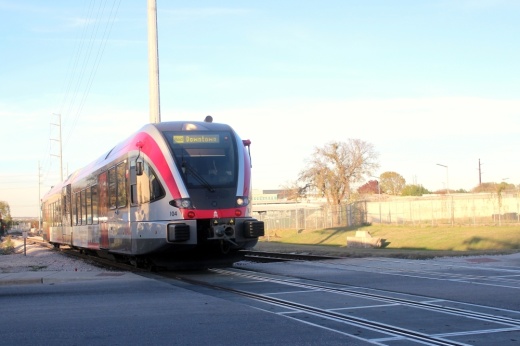Beyond laying out each group’s responsibilities for the $7.1 billion transit expansion, the agreement includes language around equity considerations, labor policies and community engagement.
“This is the first time that the three entities that have the responsibility for delivering Project Connect, now that the voters have said yes, have come together to approve a document that I would describe as the rules of the road, or the rules of the rails, so to speak, for how Project Connect is implemented over the next decade,” said Sam Sargent, Director of Strategy at the Austin Transit Partnership.
He added that the document has precedent in transit projects in other cities, including a two-party agreement in Houston and a three-party agreement in Phoenix.
The meeting was held in the Austin Convention Center, and the decision to delay voting on the agreement came following technical difficulties with public commenters calling in remotely.
The document’s language had also gone through edits throughout the week, as a coalition of social justice and labor groups raised concerns about some of its contents.
Specifically, the ATX Mobility Coalition released a statement Oct. 27 saying the document fell short on community oversight, equity commitments and keeping Capital Metro and the Austin Transit Partnership independent.
The consortium includes the Austin Justice Coalition, People United for Mobility Action, Planning Our Communities, the Workers Defense Action Fund and the Austin Area Urban League.
Joao Paulo Connolly, the organizing director at the Austin Justice Coalition, said he understands the massive transit expansion is a new concept for all parties involved.
However, he has concerns about how the Community Advisory Committee, which provides guidance to the three parties on equity issues, has been kept in the loop thus far.
“If the Technical Advisory Committee around equity and design is looking at a specific policy, we want to make sure that the Community Advisory Committee knows and is briefed on that, and [is] also looking at that policy,” Connolly said.
He added the Austin Transit Partnership and Capital Metro need to be independent to ensure Capital Metro continues to provide high quality service throughout Project Connect, which is expected to take over a decade to develop.
In particular, the ATX Mobility Coalition stated it wants to see independent leadership for the two organizations—a reference to Randy Clarke’s role as chief executive officer at Capital Metro and executive director at the Austin Transit Partnership.
Capital Metro spokesperson Jenna Maxfield said any decision to implement new Austin Transit Partnership executive leadership would need to come from its board of directors.
“The [Austin Transit Partnership] has Independence on contracting and other financial decisions and accountability that are critical to the success of the program and the trust of the community,” Maxfield said in an email. “However, [the Austin Transit Partnership] and [Capital Metro] must be inextricably linked in order to seamlessly deliver both construction and operation of the new system in partnership.”
The Workers Defense Action Fund said it wanted to ensure Project Connect construction would have proper oversight by having the joint powers agreement commit to the Better Builder Program, a city of Austin worker safety standard.
However, spokespeople from the labor group said during the Oct. 29 meeting they are neutral on the joint powers agreement after the latest updates, which gave local groups the authority to approve onsite monitors to ensure workers are treated fairly.
Austin City Council, Capital Metro and the Austin Transit Partnership said they plan to reconvene to approve the joint powers agreement as soon as possible. It is to be determined if that vote will come at three individual meetings or at another joint meeting.





